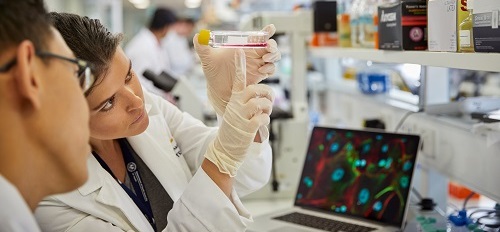
In this blog, we're highlighting two ground-breaking research projects that are leading the charge in improving outcomes for people affected by melanoma.
Every year, we invest millions of dollars to outstanding research teams across the country, thanks to the generous donations of the Cancer Council community.
We're currently funding two projects looking for new ways to treat melanoma, one of the most common cancers in Australia. Read on to learn more.
1. Reversing treatment resistance in melanoma
Dr Jessamy Tiffen, Centenary Institute
Dr Tiffen and her team are looking for new treatment approaches for advanced melanoma through epigenetics.
Put simply, epigenetics is the study of the information layered on top of DNA. Sometimes this information can change and alter the way a gene behaves, leading to cancer.
New immunotherapies and targeted treatments have provided hope for patients with advanced melanoma, but for many patients these treatments are ineffective or only work for a limited time before the cancer develops resistance.
In this project, Dr Tiffen will investigate an epigenetic process called histone methylation that they believe plays an important role in making melanoma cells resistant to treatment.
Dr Tiffen hopes that by deepening our understanding of the epigenetics of melanoma, we may be able to identify potential new treatment approaches to improve outcomes for patients with advanced melanoma.
2. Finding new treatment targets for advanced melanoma
Professor Gabrielle Belz, The University of Queensland
Professor Belz and her team are looking for alternative treatments for advanced melanoma.
Currently, the most effective treatment for advanced melanoma is immunotherapy, which uses the power of immune T-cells to attack tumour cells. The issue is that more than 40% of metastatic melanoma patients are not cured with these therapies.
In this project, Professor Belz and her team will explore the role and function of a different group of immune cells called innate lymphoid cells (ILCs) which might play a significant role in killing melanoma cells.
Professor Belz and her team aim to investigate the relationship between ILC2 and melanoma to discover how ILC2 controls melanoma progression. They hope that this will enable them to identify new drug targets to develop new treatments in the future.
Thanks to the generosity of the Cancer Council community, we can invest millions of dollars to fund new research projects every year.
Click through to learn more about other projects we're currently funding or how we choose which projects to fund.






